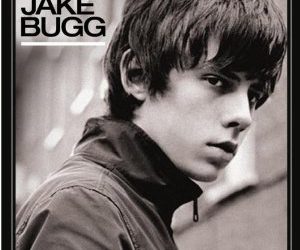
Jake Bugg – Jake Bugg
傑克巴格 英國民謠新偶像創作歌手
Buy: Jake Bugg
The Bob Dylan comparisons have followed Bugg around since he started making waves earlier this year and, while they’re not totally misplaced, they don’t do the breadth of his influences justice. A quick blast through this album and you hear a wealth of influences that sounds like a who’s who of British music over the past 50 years – from The Beatles and Stones through to The Smiths, The La’s, Oasis, The Coral, The Libertines, Arctic Monkeys, Miles Kane and a few more I’ve not quite put my finger on yet.
Usually, a list of comparisons like that would result in this sentence ending with the word ‘unoriginal’, but in the case of Jake Bugg it ends with ‘inspired’. The album’s not a total world-beater though, thanks mostly to the overly-simple production rendering some sections a bit samey, but it’s not far off – and above all it positions Jake Bugg head and shoulders above the likes of Ed Sheeran and Frank Turner as the most exciting male singer-songwriter around.
The highlight of the album is undoubtedly the mesmerisingly simple ballad ’Broken’, followed closely by ’Ballad Of Mr Jones’, a moody narrative mixing the razor-sharp observations of Alex Turner with the gothic atmospherics of Nick Cave.
Out of the 14 songs on Jake Bugg, about 10 of them are not just good – but absolutely brilliant. The side gets let down slightly by the lack of variation, but when you’re this good that’s not really a problem.
MUSIC INTERVIEW: JAKE BUGG
English Singer-Songwriter Arrives With Lightning Bolt Of A Debut
By: Team Buzzine
January 25, 2013
Ahead of the U.S. release of that self-titled album, Jake has been playing a few select dates around America, and that meant that before his sold-out show at L.A.'s Troubadour, Buzzine’s Stefan Goldby had the chance to sit down up with Mr. Bugg at our Hollywood House to discuss his roots, the songs that have changed his life, and the things that he has learned in order to be able to stay grounded within the heart of a gathering musical storm...
Stefan Goldby: Your musical beginnings were very much intertwined with your family: Both your parents recorded music, your uncle gave you your first guitar lesson; you first played in your cousin's band... With all that music around you, did it make you quickly define what your kind of music was, something that was yours alone?
Jake Bugg: Yeah, there was a lot of musical people in my family and I think that played a role, but I kind of felt like I wanted to go on my own discovery and discover a lot of artists. I'm a really big fan of the blues, and my family; they're not so much into the blues. It's something that means something to me.
I guess people introduce you to things all the time. My uncle, he played me Jimi Hendrix for the first time and I just remember being blown away... but also, it's disheartening hearing Jimi Hendrix for the first time because you think, "Oh, I'm not going to play like that!" You know? But yeah, it's cool - I love discovering new things, it's great...
SG: An immediate number one in the UK, first week, with your debut album - that's something pretty special! It was a moment that had it's roots in a big break from the BBC, leading to an appearance at The Glastonbury Festival. Can you talk a little bit about how that all came together for you, and helped get the ball rolling?
JB: The BBC's been great and Glastonbury looks after me! I sent a few demos to a guy at BBC Nottingham, Dean Jackson, and he was like, "I want to play them on my show straightaway." He started playing them and then I sent them forward to Radio One and they started playing them, and they offered me to play Glastonbury and that really helped. And from then, I did a few more demos with a guy who knew a guy, and it just kind of works like that... And I got signed fortunately with no hype or any buzz around what I was doing, so I was quite fortunate - they just let me make a record and get on with what I do, and it's been great!
SG: Your music is very heartfelt, very simple, in some ways very pure. Is it strange to have something so intimate and personal become so big and so out there so quickly?
JB: Well, it is strange for it to take off as much as it did like that. I mean for a few years, it was just me and my guitar in my bedroom. For it to be able to go all over the world and play people my music... I mean of course I want to share it with the world and I want them to connect with my songs. I think that's important. I think it's about singing with soul and being honest.
SG: You only get one chance to make your first record. What were the factors in your mind, wading through all the different stuff that you've written, to pick the ones were ‘the final cut’?
JB: Well, it was a strange thing, doing the record. I had quite a lot of songs that didn't make it on there, but I had to think, "I'm the person writing these songs and maybe necessarily not the best person to choose how I'd like to listen to it", because I'm very critical of my own work. So what I did, is I'd ask a few fans or people I worked with, or family or whatever, and let them make a tracklist in a way they'd like to hear the album, looked at what came back the most, and then sat down, listened to it a couple times... I don't enjoy listening to my music, but I kind of had to make sure I was okay with the record, and so that's what I did.
SG: Is there a day or a session from the making of the album that stands out most in your mind; something that might sum up how it felt to make this record?
JB: Well, it's not like we just went into the studio and put everything down. It was recorded in various parts. It felt like a very natural progression and it seemed to come together nicely.
I guess the moment where it felt like it was authentic to me was the last song on the album… it was recorded on my iPhone just as a demo and the label was like, "Well, let's use it, because that's the best version we've got." And that was cool for me. I was surprised, a major record label saying “Let's use this rough little demo”. It felt real, you know?
SG: Your hometown of Nottingham is not a city that frequently features on the world's musical map, and a few of your songs don't necessarily paint it as an idyllic place to live either. What part of your music is borne of where you grew up?
JB: I guess where I grew up influences my music, a lot of its references; a reference like, for example, all the speed bumps and the tower blocks... You know, it's simple in a way because I'm just singing about what's there, but in a way that expresses my feelings of a place.
Sometimes it's hard to talk about how you feel about something or somewhere… well, for me anyway! Music, for me, is a way of being able to do that in a way I feel comfortable with...
SG: Now that you are travelling outside of Nottingham and seeing a little more of the world, has that given you a different appreciation of your hometown as a place?
JB: I've just realized there's a lot more out there because before, last year before anything had even happened, I'd never even left England. Lived in Nottingham for all my life and probably the only other place I went was Skegness for a holiday, you know? [Laughs] So to be in L.A., and see New York and rural America and the rest of Europe, it really broadens your mind and it gives you a lot more to write about.
I kind of feel sorry for people who... Well, maybe 'feel sorry' are the wrong words… but I hope that my friends back in Nottingham see what I've done and go away and do what they want to do and be inspired, and hopefully have a lot of success with what they want to do...
SG: Your music and your lyrics have definite echoes within them that seem to reflect the story of your life. How aware of that were you when it came to making music videos, which are a little bit more explicit? A couple of those certainly could be interpreted as, "Oh my gosh, this is Jake's upbringing", when that may not be exactly true…
JB: Well, that was my life and that is the way it was. And if anything, I probably made it less of a story than it is because I want to sing about my life and my experiences and share them with people. But with also trying to keep everybody happy, it's very difficult. It's a balance. And videos, yeah, you actually see it then instead of listening to a song, which is like reading a book where you have to use your own imagination. The picture, it's there: It's in front of you.
SG: Aside from your recorded work, and the videos, another aspect of your work that’s really capturing people’s attentions is the power of your live shows. What do you think has changed the most from when it was just you playing around Nottingham a couple of years ago, to today when you're going to go straight out onto the stage of the Troubadour in Los Angeles for the first time?
JB: For me, I guess what's changed is before I'm doing the shows that I'm doing today, I was going out there - I was putting myself out there just playing pubs and clubs and developing my craft, just seeing what people's instinctive reactions was to my music, and helping that to help me create and do better.
Now, people are turning up to specifically come and see me play, and so I have to put on a show. Every time I sing those songs… I must have sang them over a thousand times, but each time I'm singing the songs, you got to sing them like they're the first time you ever have. You got to make people believe that. So I guess it's more of a performance and a show than developing my craft...
SG: Is there a difference, in your mind, going out as a headliner now, as opposed to opening up for big names like the Stone Roses, or Noel Gallagher?
JB: Well, when you're supporting, there's less pressure because people… some of them will be there to see you when you're supporting… but the majority are there to see you headlining it. But it don't make much difference to me; I still feel like I've got to give it 100% every time. Sometimes I do it just me and my guitar, but tonight I'll have my band. Just a three-piece, though - just the bass player and drummer; I like to keep very stripped back. But there is a difference, yeah.
SG: As a performer, what turns a show into a job well done for you? What do you hope the audience walk away thinking?
JB: That they want to come again?!! That's it. You want people to want to come and see you again. There are people that will see you, they might come twice, two nights in a row, and see the same show. So each time, I try to add a little bit different, so every time they come it's not the same thing, that they're seeing something new and seeing the actual show develop, so they feel part of it. I guess that's the main thing. I want them to feel part of it.
SG: Live shows have really been the one constant in the middle of almost everything else in the music industry changing over the last decade. Even for you growing up here in the 21st century, things are different now than they were 10 years ago as a music fan. Do you think you view it differently than an artist who was already established 10 years ago and who's tried to adjust to everything that has changed so much?
JB: I guess so. But I mean, as an artist and a performer, for someone like me as a songwriter, it's about music, and songs, and making records. Because the live part of it is so important now, it means there's less time to write songs and write records. But at the same time, you want to share it with the world and you want people to hear these songs. It's inspiring. But yeah, I'd imagine it must be a bit strange. It's all I know. Ten years ago, I don't know what I was doing! So, yeah, it must be strange.
SG: The majority of the music you've released to this point was written within familiar surroundings. Now that the world has opened up so much for you, do you write on the road, or do you wait until you return home?
JB: I love to write whenever I can. When I'm in the hotel room or backstage, I'll pick up a guitar because I love it. I love writing songs. I mean it's difficult to write songs being on the road because your head's in a different mindset. Your headspace, a lot of the time it's not there. And usually when you need a couple of weeks off and getting yourself in a studio, everything… all the things that you saw on the road come to you… and it clicks. But yeah, a lot of second albums are based on waiting around in airports and dressing rooms, so you got to be careful that doesn't happen.
SG: You've talked about how Don McLean's “Vincent” was one of the things that first got you into music. If you think about your life so far, is that the moment where a single song has impacted you the most, or is there another song that you would you say has most changed your life?
JB: Well, that song definitely played a significant role in my life, definitely. Because I heard it and I was like, "Wow. What is that? Why do I like it?" What interested me about it is I didn't understand why I liked it.
That led me on to many other things, more of his music and his influences, like Buddy Holly and bands like The Weavers. But whenever I discover a new song, it's still that same feeling, like, "Wow!", and you want to listen to it over and over again. I never do, because I never want to kill the song off, you know... I probably haven't listened to that “Vincent” song for a couple of years now... it's still that exciting feeling, but that was the first time it happened, so that makes it more special. It was kind of an epiphany, in a way.
SG: Are you aware that you're kind of doing that for other people when you're writing your own music? That your songs are being dispatched to the world, taking on lives of their own?
JB: Well, I'm sure none of my songs are nowhere near as good as that Don McLean “Vincent” song, but at the same time, I understand that music plays a role in people's lives, and your song could be played at somebody's wedding or someone's funeral. It's just amazing to think...
What amazes me is how something that was recorded in the space of 2 minutes 30 has been captured, and then it stands up over a period of time and it plays a role. Like my song "Broken," for example, the vision I had, is some receptionist has just broken up with her boyfriend and she goes home and the first thing she do is she wants to listen to some Jake Bugg. And as dark as it is, she starts crying her eyes out. It's just the vision. [Laughs] Yeah, I mean you can't do a day without listening to a piece of music. It's everywhere!
SG: If we were to sit you down with that 12-year-old version of you and played an edited highlight reel of the last 12 months, what do you think would be the moment that would most impress that kid?
JB: Probably the fact that I'm sat here right now: It could be anything! I wouldn't know what to think - It could ruin everything, because you'd dictate your thoughts of, "Wow, what did I do to get there?" rather than just doing it... [Smiles]
But the album going to number one was a pretty special moment for me. I never once thought that would ever happen.
SG: Where were you when you found out?
JB: In a hotel room. Just a hotel, and I rang a few family and friends. They were all going a bit mad and stuff, but for me it didn't sink in. The next day I came over to the States to do the tour with Noel [Gallagher] and Snow Patrol, so it was probably the best thing that could have happened. I just got away from it all and started over again. When you start over again in another country, it reminds you why you started playing music in the first place.
SG: Is it safe to say that you have exceeded any specific goals that you set for yourself with this project?
JB: No, not at all. I was just making a record. The definition of 'making it' to me is being able to live comfortably as a working musician and songwriter, and as long as I can keep making records and get by, then that's all well: That's my goal.
SG: You've said that you do like to write all the time, that element of craft is a constant for you. Your debut is about to be released here in America, but it seems as if in your personal headspace, you could already be developing new material, a second album… do you have to find a balance between your creative drive and the ‘real world's’ expectations?
JB: That's right, true... My fans will be listening to the first record while I'm touring somewhere else, working on songs for the second one. But with this first album… you obviously get a lot more time... so I don't feel pressured about a second record.
I'm just going to write some tunes and enjoy it, because the first one did more than I could ever ask for. People assume that puts pressure on, but it doesn't because I didn't expect it to happen. So I just hope that, personally, I don't worry about what anybody else thinks about the second record, as long as I know as an artist that I've written it to the best of my ability, up to a substantial level that I'm happy with. Then that's cool. But obviously, I still want people to connect with the songs off it, and enjoy it, and get pleasure from listening to it… [Smiles]
Jake Bugg’s self-titled UK #1 album is released in the U.S. by Mercury Records on April 9, 2013
Check out Buzzine's exclusive photo gallery of Jake Bugg Live at the Troubadour and our album review.
 音樂訪談:傑克·巴格英國創作歌手帶著閃電箭一亮相:隊Buzzine的2013年1月25日
音樂訪談:傑克·巴格英國創作歌手帶著閃電箭一亮相:隊Buzzine的2013年1月25日 音樂訪談:傑克·巴格英國創作歌手帶著閃電箭一亮相:
隊Buzzine的2013年1月25日在過去的幾個月已取得了年輕的英國歌手,詞曲作者傑克巴格硬性。來自諾丁漢的18歲的小伙子已經從播放本地的演出,並寫在他的家庭主演的BBC,獲得好評如潮,在格拉斯頓伯裡音樂節,玩的圖標,如The Stone Roses和諾埃爾•加拉格爾的歌曲,然後看到他的首張專輯進入英國排行榜的頭號。
之前,同名專輯在美國發行的,傑克已經打了幾個選擇日期美國各地,而這意味著,之前,他滿座的節目在LA的游吟詩人,Buzzine的斯特凡,Goldby有機會,坐下來與在我們的好萊塢樓的巴格先生討論他的根,歌曲已經改變了他的生活,他已經學會的東西,為了能夠保持的聚會音樂風暴中心內接地...斯特凡Goldby:你的音樂開始很交織在一起,你的家庭:無論你的父母錄製的音樂,你的叔叔給你的第一把吉他教程,你第一次打在你的表妹的樂隊...你周圍的所有音樂,讓您快速定義你的類型的音樂,是你一個人的事情嗎?巴格傑克:是的,有很多的音樂人在我的家庭,我認為起到了一定作用,但我的感覺像我想在我自己的發現,並發現了大量的藝術家。我是一個真正的大風扇的藍調,和我的家人,他們沒有那麼多到布魯斯。這件事情,對我來說意味著什麼。我想向你介紹的東西所有的時間。我的叔叔,他打了我Jimi Hendrix的第一次,我只記得被吹走...而且,它是令人沮喪的聽證會Jimi Hendrix的第一時間,因為你想,“哦,我不會玩這樣的!”你知道嗎?但是,是的,這很酷 - 我喜歡發現新的東西,這是偉大的...SG:立即在英國的第一個星期,您的首張專輯 - 這是非常特殊的東西!這是一個那一刻起,它的根從英國廣播公司的一大突破,導致出現在格拉斯頓伯裡音樂節。
您能否談談如何,都一起為你一點點,球滾動幫助嗎?JB:英國廣播公司有了很大的格拉斯頓伯裡照顧我!我派了幾個演示院長諾丁漢,傑克遜在BBC的一個傢伙,他想,“我想打他們上我的節目通俗易懂。”他開始打他們,然後我給他們送去著收音機一,他們就開始打他們,和他們給我打格拉斯頓伯裡,這真的幫了。從那時起,我做了一些演示誰知道一個男人和一個男生,只是這樣的作品... ,我得到了簽署幸運的是沒有炒作或嗡嗡聲,周圍我在做什麼,所以我很幸運 - 他們只是讓我做一個記錄,我做什麼,和它的偉大!SG:你的音樂是發自內心的,很簡單,在某些方面非常純淨的。很奇怪,有如此親密和個人變得如此之大,所以有這麼快嗎?
JB:嗯,奇怪的是它起飛一樣,因為它不喜歡。我的意思是幾年,這只是我和我的吉他在我的臥室。它是能夠去世界各地,並發揮我的音樂...當然,我的意思是,我想與世界分享它,我希望他們與我的歌。我認為這很重要。我認為這是用靈魂唱歌和誠實。SG:你只有一次機會,使您的第一個記錄。究竟是什麼因素在你的心中,涉水通過所有不同的東西,你已經寫了,要挑選那些“晉級決賽”?JB:嗯,這是一個奇怪的事情,做記錄。我有相當多的歌曲,沒能在那裡,但我有沒有想過,“我寫這些歌曲的人,也許不是最好的人選擇如何,我想,聽” ,因為我是我自己的工作非常關鍵的。所以我做什麼,我問了幾個風扇或我的工作或家庭或任何人,讓他們做一個曲目的方式,他們想聽到的專輯,看著回來的最然後坐了下來,聆聽了幾次...我不喜歡聽我的音樂,但我種,以確保我沒事的記錄,所以這是我做了什麼。
SG:從製作的專輯,最突出的在你的心中是否有一天或一個會話的東西,總結,感覺如何創造這個紀錄嗎?JB:那麼,它不喜歡我們剛剛進入錄音室,並把所有的東西下來。它被記錄在各部分。這感覺就像一個很自然的過程,它似乎很好地走到一起。我猜那一刻在那裡它感覺像它是真實的我的是在最後的歌曲的專輯...它被記錄在我的iPhone就像一個演示,並在標籤是一樣,“好吧,讓我們使用它,因為那是最好的版本我們“有。”對我來說這是很酷的。我很驚訝,一個主要的唱片公司說:“讓我們用這種粗糙的小演示”。這感覺真實的,你知道嗎?SG:是不是你的家鄉諾丁漢的城市,頻繁的特點對世界的音樂地圖,和一些你的歌曲不一定畫它作為一個田園詩般的地方活多久。承擔的哪一部分你的音樂,你長大了嗎?JB:我想我長大的地方會影響我的音樂,其引用了大量的參考,例如,像所有的速度顛簸和塔塊...你知道,這很簡單的方式,因為我只是在唱什麼,但在一個地方的方式,表達我的感情。有時談論你的感受的東西或其他地方......好吧,反正對我來說這是很難的!音樂,對我來說,是一種能夠做到這一點的方式,我感覺很舒服...
SG:現在,你已經諾丁漢看到一個小的世界,更是給你一個不同的角度理解你的家鄉,作為一個地方嗎?JB:我剛剛意識到有很多更多,因為在此之前,去年前甚至發生什麼了,我從來沒有離開過英格蘭。我所有的生活和居住在英國諾丁漢可能是唯一的其他地方,我去斯凱格內斯的假期,你知道嗎? (笑)所以要在洛杉磯,紐約和美國農村地區和歐洲其他國家,它真的拓寬了你的頭腦和它為您提供了更多的可寫。我有點覺得對不起的人誰...好吧,也許“感到遺憾”是錯誤的話......但我希望我的朋友在諾丁漢看我做了什麼,離開,做他們想做的事,得到啟發,並希望有很多的成功與什麼他們想要做的...SG:你的音樂和你的歌詞有一定的呼應,他們似乎反映了你的生活的故事。如何知道你什麼時候來製作音樂視頻,這有一點點更明確的呢?一對夫婦的人肯定會被解釋為,“噢,我的天哪,這是傑克的成長”的時候,可能不完全正確的...
JB:嗯,這是我的生活,這是它的方式。如果有的話,我可能少了一個故事,而不是那是因為我想唱的是我的生活,我的經驗,並分享他們的人。但也試圖讓每個人都高興,這是非常困難的。這是一個平衡。和視頻,是的,你真正看到它,然後而不是聽一首歌曲,這就像讀一本書,你必須使用自己的想像力。的圖片,它的存在:這是在你的面前。SG:除了您所錄製的工作,和視頻,你的工作,真正捕捉人們的關注的另一個方面是權力的現場表演。你認為什麼變化最大的當它是你玩的諾丁漢一對夫婦幾年前,時到今日,你會直來直去的第一次走上舞台的游吟詩人在洛杉磯的嗎?
JB:對於我來說,我想改變的是我做的節目,我今天幹的,我走出去 - 我把自己只是在玩酒吧,俱樂部和我的手藝,只是看到什麼人的本能的反應是我的音樂,幫助,幫助我建立和做的更好。現在,人們正在轉向專門來和我玩,所以我必須把表演。每次我唱的那些歌,我要唱了他們一千次,但每次我唱的歌曲,你一定要唱他們就像他們是你第一次。你得讓人們相信。所以,我猜測它的性能和顯示我的手藝比開發更重要的是...SG:是有區別的,在你的心中,現在走出去作為頭條新聞,而不是開放的石玫瑰,或諾埃爾•加拉格爾等大牌嗎?JB:嗯,你支持的時候,有更少的壓力,因為人們...有些人會在那裡看到你時,你支持...但大多數人看你領銜。
但它不會讓我太大的區別,我還是覺得我得給它100%的時間。有時候,我做的只是我和我的吉他,但今晚,我會讓我的樂隊。僅有三件,雖然 - 只是貝司手和鼓手,我喜歡保持非常剝去。但是是有區別的,是的。SG:作為一名演員,將表演到為你做了出色的工作嗎?你希望觀眾走開想什麼?
JB:他們要再來一次!就是這樣。你希望人們要來再次見到你。有些人會看到你,他們可能會來兩次,兩晚成一排,看到相同的顯示。所以,每次我嘗試添加一點點不同,所以每次他們來了,這是不一樣的東西,他們看到一些新的東西,看到實際顯示的發展,讓他們覺得它的一部分。我想這是最主要的。我希望他們能感到它的一部分。SG:現場表演真的已經在中間的幾乎所有其他在音樂行業在過去的十年變化的一個常數。即使你在這裡長大在21世紀,情況就不同了,現在比10年前作為一個音樂迷。你認為你不同的方式查看它不是一個藝術家已經成立10年來,誰是試圖調整到的一切,都變了嗎?JB:我想是這樣。不過,我的意思是,作為一個藝術家和表演者,作為一個作曲家像我這樣的人,這是關於音樂,歌曲,並作記錄。因為生活的一部分,它是非常重要的,這意味著有更少的時間來寫歌和寫記錄。但在同一時間,你想與世界分享它,你希望人們聽到這些歌曲。這是鼓舞人心的。但是,是的,我想像它必須是一個有點怪怪的。這是我所知道的。十年前,我不知道我在做什麼!所以,是的,它必須是陌生的。SG:寫在熟悉的環境中的大部分已經發布了這一點,你的音樂。
現在,世界已經打開了你這麼多,你寫的道路上,你等到你回家嗎?JB:我愛寫時,我可以。當我在酒店房間或後台,我會拿起吉他,因為我喜歡它。我愛寫歌。我的意思是,因為你的頭是在一個不同的思維方式,這是很難寫的歌的道路上。您的頂空,它不存在了很多的時間。通常當你需要一兩個星期,在攝影棚裡,讓自己的一切......所有的東西,你看到的道路上來找你的,它的點擊。但是,是的,有很多的第二張專輯的基礎上等待在機場和更衣室,所以你要小心,不會發生。SG:您談到了如何唐·麥克萊恩的“文森特”的事情之一,首先,你到了音樂。
如果你覺得你的生活至今,是其中一首歌曲已經影響了你的大多數,或者是有另外一首歌你說,你會改變你的生活的那一刻嗎?JB:好了,這首歌絕對是在我的生活中起到了重要的作用,絕對是。因為我聽見了,我當時想,“哇,那是什麼?為什麼我喜歡它嗎?”是什麼讓我感興趣的是,我不明白為什麼我喜歡它。這使我對許多其他的東西,他的音樂和他的影響,像Buddy Holly和樂隊如織工。但每當我發現了一個新的歌曲,仍然是同樣的感覺一樣,“哇!”,你要聽一遍又一遍。我從來沒有這樣做,因為我從來沒有想殺死的歌曲,你知道...我可能沒有聽過,“文森特”這首歌,現在一對夫婦的年...它仍然是令人興奮的感覺,但是這是第一次發生,這樣就使得它更特別的。這是一種頓悟的一種方式。SG:你知不知道你這樣做,其他人當你寫你自己的音樂嗎?您的歌曲是被派往世界,以他們自己的生活嗎?JB:嗯,我敢肯定,我的歌是沒有遠不好,唐麥克林“文森特”歌曲,但在同一時間,我明白了,音樂在人們的生活中扮演的角色,可以發揮你的歌別人的婚禮或他人的葬禮。這只是令人驚訝的想...讓我吃驚的是怎麼樣的東西,錄得2分30空間已被抓獲,然後站起來,過了一段時間,它起到了重要作用。喜歡我的歌“壞了,”例如,我的眼光了,是一些接待員剛剛與男友分手了,她回到家裡,她做的第一件事是,她要聽一些傑克巴格。黑暗的時候,她開始哭泣她的眼睛。這僅僅是視覺。
(笑)是啊,我的意思是,你不能做了一天,而不用聆聽一首樂曲。它無處不在!SG:如果我們與你坐下,你12歲的老版本的,在過去的12個月中發揮了編輯的集錦,你怎麼想的那一刻起,將那個孩子留下深刻的印象呢?JB:可能是事實,我現在坐在這裡:它可以是任何東西!我不知道在想什麼 - 它可能會毀掉一切,因為你決定你的思想,“哇,那我做那裡?”而不是只是做... [微笑]但要頭號專輯對我來說是一個非常特殊的時刻。我根本就沒有想到,會不會發生。SG:你在哪裡,當你發現了嗎?JB:在一間酒店房間。只是一個酒店,我打電話給幾個家人和朋友。他們都有點瘋狂之類的東西,但對我來說,沒有下沉英寸第二天,我走了過來,美國做旅遊與諾埃爾[的加拉格爾]和雪巡邏,所以它可能是最好的事情,可能會發生。
我剛剛拿到了這一切,又重新開始了。當你在另一個國家重新開始,它會提醒你,為什麼你開始玩音樂擺在首位。SG:它是安全的說,你已經超過這個項目,你為自己設定什麼具體的目標嗎?JB:不,一點都沒有。我只是一個記錄。定義'使'給我舒適的生活作為工作的音樂家和作曲家,只要我能保持作記錄,並獲得通過,那麼這一切都很好:這是我的目標。SG:你曾說過,你不喜歡寫的所有的工藝,該元素是一個常數。你的處女秀發布在這裡在美國,但它似乎好像在您的個人頂空進樣,你可能已經被發展新材料,第二張專輯...你你有找到你的創意驅動器和的“真實世界的”之間的平衡期望呢?JB:這是正確的,真實的......我的歌迷會聽的第一條記錄,而我遊覽其他地方,在歌曲的第二個工作。但是,這第一張專輯...你顯然得到了更多的時間...所以我不感到有壓力,大約一秒鐘的記錄。我只是寫一些音樂和享受它,因為第一個做比我更能夠要求。人們以為的壓力,但它沒有,因為我不希望它發生。所以,我只是希望,個人的,我不擔心什麼其他人認為的第二個記錄,只要我知道,作為一個藝術家,我已經寫盡我所能,達至相當程度,我很高興。那太酷了。但很明顯,我還是要聯繫的人的歌曲,關閉它,享受它,並獲得樂趣聽... [笑]傑克巴格的同名英國的第1張專輯在美國發行,2013年4月9日水星紀錄退房Buzzine傑克巴格現場的獨家照片畫廊的游吟詩人和我們的專輯檢討。
photo by Steve Collins - © eFestivals.co.uk
send this photo as an eCard
photo by Steve Collins - © eFestivals.co.uk
send this photo as an eCard

photo by Steve Collins - © eFestivals.co.uk
send this photo as an eCard

photo by Steve Collins - © eFestivals.co.uk
send this photo as an eCard



沒有留言:
張貼留言